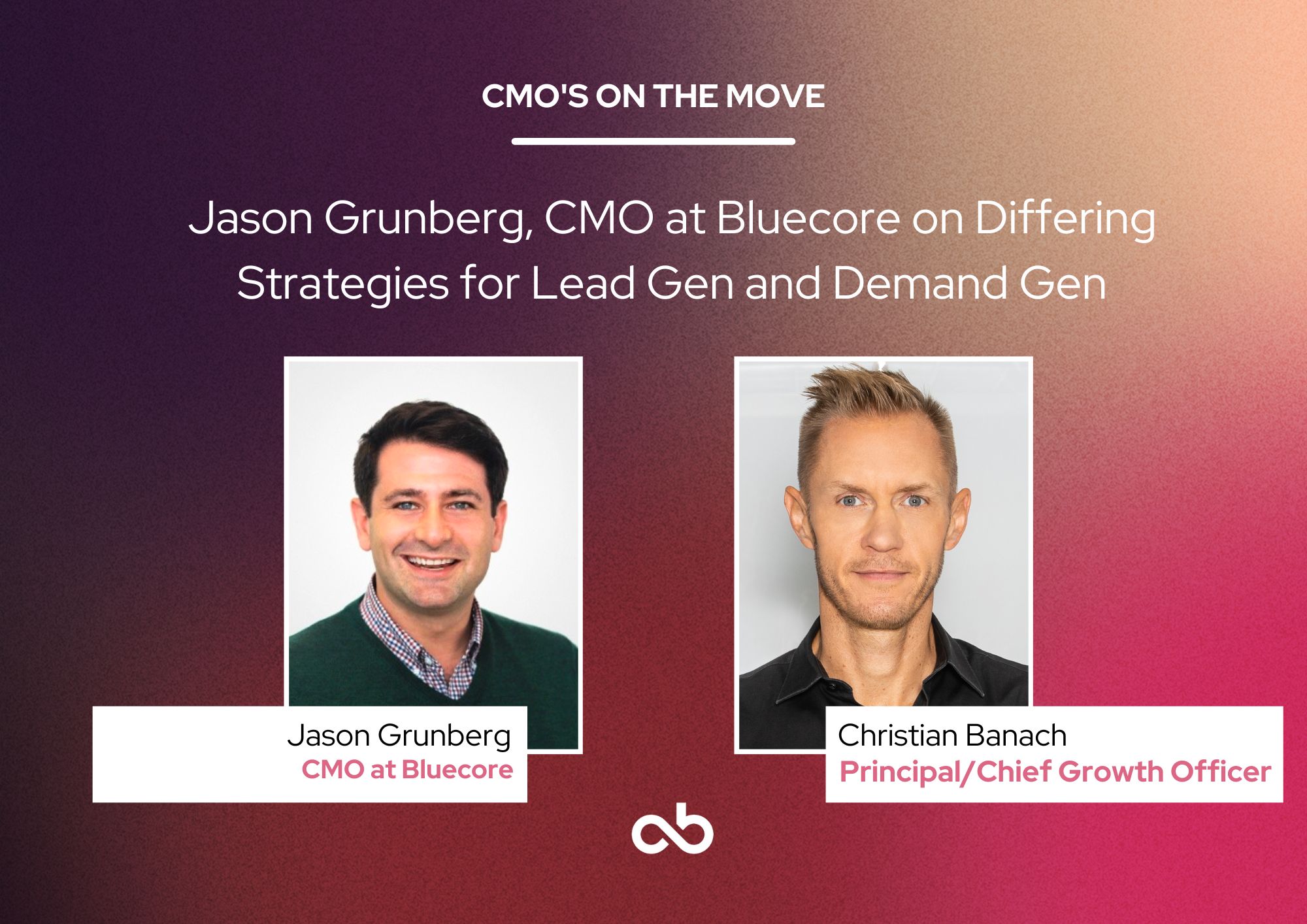/ Executive Interviews
Jason Grunberg, CMO at Bluecore on Differing Strategies for Lead Gen and Demand Gen
By: Christian Banach



Retail MarTech firm Bluecore recently appointed Jason Grunberg as CMO. A trailblazer in retail marketing technology, Grunberg has over two decades of experience, including client-side roles at Sailthru and Marigold, and agency-side roles at firms like The Mix and DC3. During that time, Grunberg built a reputation for spearheading customer-centric initiatives and introducing groundbreaking retail programs.
Christian sat down with Grunberg to discuss his professional history and his plans for driving growth and keeping Bluecore relevant.
Where to find Jason Grunberg: LinkedIn
Where to find Christian Banach: LinkedIn
Christian:
Give us a glimpse into your upbringing, your education, and any significant early life experiences that shaped who you are today.
Jason:
When I was in high school, I picked journalism as the thing that I really latched onto. I joined the high school newspaper, was doing a high school yearbook, and started freelancing for a local newspaper in New Jersey. I spent those four years in high school really, really focused on that.
I ended up being accepted into the Newhouse School at Syracuse University, where I studied magazine journalism and public policy, originally thinking I wanted to be a political correspondent.
Christian
Why did you eventually gravitate toward marketing? Looking back, can you point to something that inspired that?
Jason:
Both of my parents were entrepreneurs. They both started their own businesses, and they both worked out of the house for a long time, so they were always “around. Seeing both of them on that journey, I began to understand that they “wore every hat” at their companies.
After discovering I didn’t really love politics, I instinctively started interviewing at marketing agencies and small firms. I think we’re looking for somebody who could wear multiple hats, rather than a large agency.
Christian:
Much of your early career was spent working at agencies. You moved from content marketing manager to VP of Marketing and then eventually CMO. To what do you attribute this great accelerated career growth that you had?
![]()
Jason:
A lot of it came from the small agency experience where I was given a lot of authority and autonomy. I was managing teams by the time I was 24 and early on (and I was really over my skis in it!)
One of the heads of strategy at an agency I was working at broke off, started her own firm, which was Tilden Marketing (and later was a collaboration with Tilden DC3). Instead of being design-focused, it truly was a branding, marketing, and communication strategy firm.
That’s where I got to work with high technology companies like Verizon and Siemens and other organizations that are kind of similar. Small agencies, big clients, big work.
My guidance to anybody who’s young in their career to be active in the pursuit of new knowledge. And if you are only looking for the title and the pay jump, you’re going to shut yourself off from what the totality of your future can look like.
Christian:
Before we spoke, I read something from you that really caught my eye: you have an approach that you call the “Relationship Demand Gen Chain.” Would love to know a little bit more about that.
Jason:
Sure, the relationship demand generation chain is a simple approach: “You need to have a point of view. You need to have points of entry for a prospect or a target audience member to engage with those points of view; you need to turn those into points of leverage, and then from points of leverage into points of conversion.
I think, especially in B2B, so many organizations focus on points of conversion, which to me is the last step in the process. And when you look at all the research that exists out there on the buyer journey, it’s not a sales process; that’s just one step.
This to me, is kind of the difference between demand generation and lead generation. Demand gen is much bigger in terms of its scope, what it does in the marketplace, and what you put in the marketplace. It might be very large activations that drive brand awareness and change brand sentiment.
Then, you move people through a chain of events that are all aimed at building a relationship with that individual. Because, you know, people buy from people. It’s not a company buying from a company.
Christian:
We have a lot of agencies that listen and read our materials here and some of them have expressed that they would like to go client-side at some point. Any advice for them?
Jason:
There’s a big part of it where, just culturally, there is a big difference in how people give feedback. The agency side, like you’re all comfortable with crit Your work gets critiqued and criticized, and you do it openly and unemotionally, where it’s just all about what’s going to be the best product.
When I started working on the brand side, people would be flabbergasted that I was so openly criticizing my colleagues’ work. And it took me a while to reframe. And my wife works in HR, and she thought, “You gotta stop that—next time make it their idea! That was a big shift in delivering feedback for me, too.
Christian:
We’ve talked a little bit about Bluecore, but love to know a little bit more, especially for those that aren’t familiar with the company.
Jason:
Bluecore is a marketing technology company that does identification and customer movement only for enterprise retailers. We’re working with the likes of Gap, Nike, Hello Yoga, and Noble.
The value of Bluecore is that we help take anonymous shoppers on the website, turn them into known, and then move them repeatedly through the purchase funnel. So they’re generating repeat purchases.
We like to think we do this better than any customer data solution in the retail stack. We really are on the data and data activation side of things. It’s an exciting opportunity because I believe that the MarTech market is so crowded that organizations really need specialists.
Bluecore is vertically specific, only going after enterprise retail. And that was a large part of why I was attracted to it. Not only is it connected to some of the roles that I’ve had in the past, but from a more focused perspective, it is really bringing to life the retail expertise that we have throughout the buyer journey.
Christian:
That’s a good segue into my next question—where do you see the future of marketing in this sector going?
Jason:
This has really been shaped by the agency experience where I chose to go B2B versus B2C because I just felt like there was opportunity in B2B to differentiate by thinking about the business buyer as a consumer.
So many MarTech companies and broader SaaS focus on the product and the features and the widget. They’re led from a product perspective.
Many companies have misconstrued the idea of what it is to build a real brand. I think we’re starting to see that take shape in technology where organizations that are really focusing on brand are being successful.
My goal is that we can do that here at Bluecore and that other organizations are going to do it because it’s not just about the brand; it’s about if you are emotionally focused or functionally focused. And are you really building a connection with an audience and building that audience?
And that’s demand gen, from my perspective—building and converting leads, which is functional in nature. I think the ones that really stand out are going to be the ones where it’s people like myself and others that have come from agencies and B2C are shaping more of the narrative on the B2B side.
Christian:
You come from the agency world and I’m curious about the team that you have at Bluecore—are you also working with any external agencies?
Jason:
We’re a relatively small team, and right now there are a lot of us, and I’ve been here for four months. We did make some partner changes at the beginning, just with folks that I’ve worked with very closely in the past.
My model tends to be strategy in-house as much as possible and execution out-of-house as much as possible.
I’m excited for us to get to the point where there are three particular activations that we have in mind for specific parts of our audience that we’re going to be looking for agency partners on: some of it is digital experiential, some is research around launch, and finally on the video storytelling side of things. I’m interested in potential folks out there who specialize in those areas.
Banach and Grunberg discussed more about Grunberg’s constant hunt for perspective and his years at Sailthru, the Mix and other agencies. You can see more of the interview here.
Edited for brevity.
Sign up now! Every Monday, get breaking news of recent CMO appointments, motivation to start your week positively, and innovative business development insights.